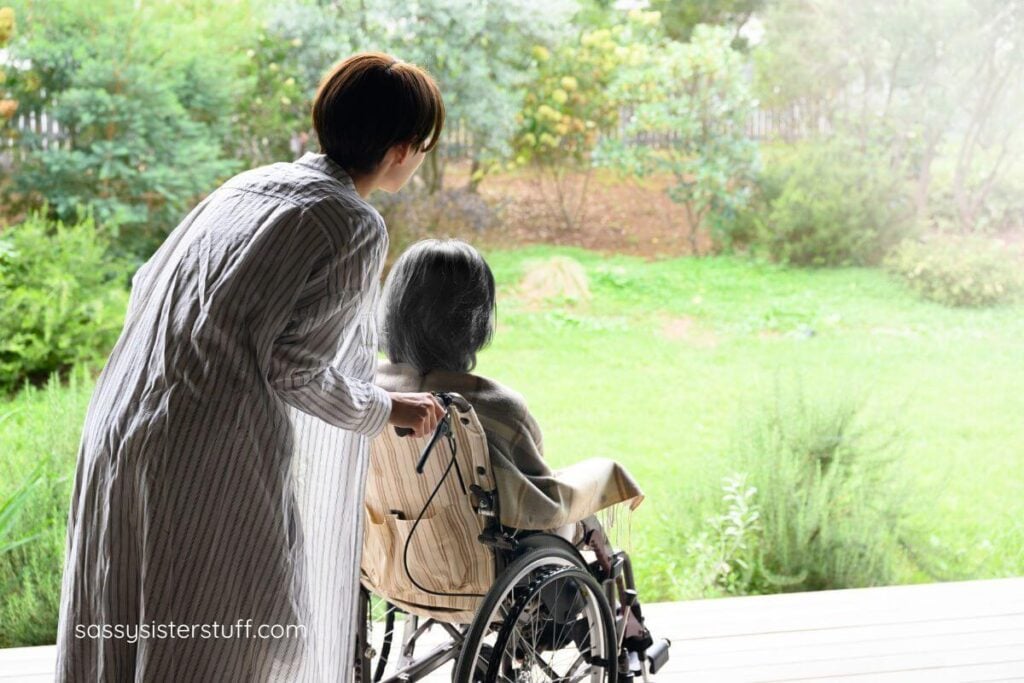Your Elderly Parent Keeps Talking About Death… Here’s Why
Senior parents might start bringing up the topic of their passing more often, even if it clearly distresses you. Why do they talk about it, and what can you do?
Hearing your elderly parent frequently speak about their own passing can be unsettling. You might feel overwhelmed, sad, frustrated, or even unsure how to respond.
These emotional conversations may leave you wondering why your elderly parent keeps talking about death and how you can handle it to preserve your peace. While it’s natural to avoid these difficult topics, understanding their reasons can help you approach this sensitive subject with empathy and clarity.

Let’s take a look at the reasons behind this frequent talk of death, what these conversations might mean, and how you can support them while caring for your own emotional well-being. Soon, you’ll feel better equipped to address these discussions with compassion, strength, and confidence.
Why Your Parent Might Be Talking About Death
Death is a deeply personal subject, but in later years, it can become a more frequent topic of conversation. Often, this isn’t to alarm you—their words are just reflections of the thoughts and emotions they are navigating.

Facing Mortality and Personal Reflection
Aging brings many changes, including the realization of one’s mortality. Older adults may feel the need to process these feelings, often verbally.
- End of Life Preparation
Older adults or those with a terminal illness may be preparing for the end of life and want to discuss their wishes or fears. - A Natural Milestone of Aging
Many people reflect on life as they age. Your parent speaking about death might be their way of coming to terms with their own sense of completion or unresolved feelings about their life’s story. - Looking for Connection
Sharing these thoughts may be their way of inviting intimacy, signaling that they trust you to share in this deeply personal reflection. - Cognitive Changes
With dementia, it can be common for a person to talk about deceased relatives or experience delusions, so it’s important to understand how to respond to these situations.
Emotional or Practical Concerns About the Future
Comments about death could also reflect anxiety about what lies ahead, both emotionally and logistically.
- Will People Remember Me?
The idea of being forgotten after they’re gone can weigh heavily on older adults. Expressing these fears could be a call for reassurance that their life had meaning and impact. - What Happens After I Die?
Talking about death might provide a subtle way to initiate conversations about practical matters like wills, healthcare decisions, or funeral preferences. - Death Anxiety
Obsessive thoughts of death can stem from anxiety, depression, or other mental health issues. If they are not physically ill, this could be the root cause and should be addressed with a doctor.
Understanding the reasons your elderly parent keeps talking about death can help frame these seemingly grim remarks in a new and more compassionate light.
The Emotional Side of These Conversations
Dealing with death on such a personal level can stir strong emotions. Becoming aware of this emotional dynamic might make these discussions feel less daunting.
Why It Can Feel Overwhelming
Hearing a parent repeatedly talk about death can trigger your own feelings of vulnerability or helplessness. This subject may unintentionally remind you of your own mortality or concerns about caregiving responsibilities.
Instead of avoiding the subject, consider using these talks as an opportunity to address unresolved feelings or fears. This approach can actually strengthen your relationship and provide both of you with emotional comfort.
Balance Their Needs with Your Own
While your parent is looking for connection or closure, you shouldn’t overlook your own emotional well-being. Each conversation should ideally leave you feeling supported, too. After a heavy discussion, consider taking time for self-care, like journaling or speaking with a supportive friend.

Talking about death doesn’t come naturally for most people, but having a plan may make these conversations easier.
Listen Without Judgment
Allow them to share their thoughts openly, even if it’s hard to hear. Avoid contradicting or dismissing their words, as this might shut down honest communication. Instead, offer supportive phrases like, “I’m here for you” or “I appreciate you sharing this with me.” Don’t negate their feelings, as this can be a way for them to process things. Give them the gift of your time and presence. You can be a great source of comfort by simply being there for them to talk to.
Focus on What They Need in the Moment
Ask them open-ended questions to better understand their priorities. For example, your parent might want to discuss more than just their funeral plans. They may seek closure about unresolved family or personal matters too. They may also need to discuss underlying physical or emotional issues contributing to their feelings. Be sure to encourage them to see the appropriate professional that can help them. Reassure them of your love and let them know you will be there to support them through whatever they are going through.
Pivot Their Words into Forward Actions
Look for ways to pivot these frequent mentions of their passing into productive discussions about future wishes. As hard as these conversations may be, you can work together to plan for essential aspects like healthcare decisions, advanced directives, or financial matters. Bringing these subjects into the open ensures clarity and removes uncertainty for both of you. You may even want to inquire about their funeral wishes. Some elderly people have very strong desires, while others are content to let the family make those decisions.

When the Conversation About Dying Feels Overwhelming
Discussions about death can sometimes feel too frequent or too heavy. Should this happen, remind yourself you’re entitled to boundaries while also being compassionate about your parent’s needs.
- Communicate With Honesty
Tell your parent if these conversations are emotionally taxing for you. You might say, “I want to support you, but I need to take a step back today so I can process what we’ve discussed.” You may need a short break, or you may need to revisit the topic on another day entirely. Be honest with your parent. - Seek External Support
If these talks lead to persistent sadness or anxiety for you or your parent, consider consulting a counselor. Therapists trained in family dynamics or grief can provide valuable tools to make these talks less daunting. You may even want to consider bringing another family member into these conversations.
Save to Your Sassy Sister Stuff Pinterest Board for When You NEED This Info
How You Can Handle These Important Moments
Confronting the subject of death often feels overwhelming, but it doesn’t have to be. Helping your parent explore their thoughts on this topic shows love, compassion, and respect for their perspective and feelings. Throughout these conversations, you’ll also gain deeper insight into their values and desires, making it easier to advocate for them as they age.
Take Small, Supportive Steps
You don’t have to handle everything at once. Focus on small, incremental conversations. Each session doesn’t need to reach a resolution; instead, treat this as an ongoing dialogue.
Acknowledge Your Wins
These discussions, while difficult, can strengthen your bond. Each time you talk through something meaningful or come to a mutual understanding, count that as a victory for your relationship.

Helping Your Parent While Caring for Yourself
It’s no small task to shoulder these emotional exchanges, but it’s also an opportunity to grow closer during this difficult season. Remember that empathy toward your parent doesn’t need to come at the expense of your personal boundaries or well-being.
By maintaining open communication, seeking support, and creating balanced dialogue, you can better understand why your elderly parents might keep bringing up the idea of their passing. These moments, however uncomfortable now, may turn into a cherished aspect of your shared life story later.
Approaching these talks with grace and intention will ultimately allow you both to move forward with greater comfort and clarity.
Final Thoughts: Elderly Parent Keeps Talking About Death
Talking about death with an aging parent can stir up emotions you didn’t expect — sadness, fear, guilt, even frustration. But these conversations can also be moments of deep connection, healing, and understanding. The more you approach them with patience and empathy (for both of you), the easier it becomes to find peace in the process.
Remember: you don’t have to have all the answers. Simply being present — listening, reassuring, and loving — is often exactly what your parent needs most. 💜
You Might Also Like:
- How to Avoid Arguing with Elderly Parents
- How to Face the Reality of Your Parents Getting Older: Compassionate Tips & Support
- 10 Warning Signs Your Elderly Parents Might Need Help
- Caregiving Advice: Walking Through Anticipatory Grief
Love to ALL! ~ Susan







